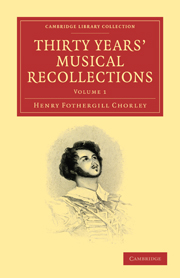THE YEAR 1839
Published online by Cambridge University Press: 29 August 2010
Summary
By this year's list of operas it will be seen that the ascendancy of Donizetti's music was on the increase. It was the first year in England of his “Lucrezia Borgia,” since so associated with the names of Madame Grisi and Signor Mario. The only other opera, unknown, though not precisely new, which was presented, was Signor Rossini's “Guillaume Tell” “Lucrezia” took hold of London from the first moment—though it is not Donizetti's best work. Signor Rossini's masterpiece has never done so, till this year of writing, (1861).
Such fact in no respect determines the value of the music accepted or rejected—merely figuring as one item, in a long list of similar cases. Dear as is Mozart's “Zauberflöte” to all musicians and lovers of melody, on the stage that opera has been only tolerated.—The reason, in both cases, is the same—the stupidity of the story.—It would appear, as I have remarked, as if the greatest of Italians had taken a despotic pride in choosing a subject, without reference to dramatic treatment, and without a leading female interest, always of the first importance to Opera, be the part long or brief.
The music, however, will grow, so long as Music lives and lasts. Year by year will be more and more seen the rare and characteristic beauty royally showered over the work, from its earliest to its latest note. In the long opening act—with no incident whatsoever till the finale is reached, and that incident (the flight of a culprit) one belonging to mechanist rather than to actor—the freshness and charm, and Swiss character of the music, sustain the opera—though such heroine as it possesses has not till then appeared.
- Type
- Chapter
- Information
- Thirty Years' Musical Recollections , pp. 166 - 174Publisher: Cambridge University PressPrint publication year: 2009First published in: 1862

